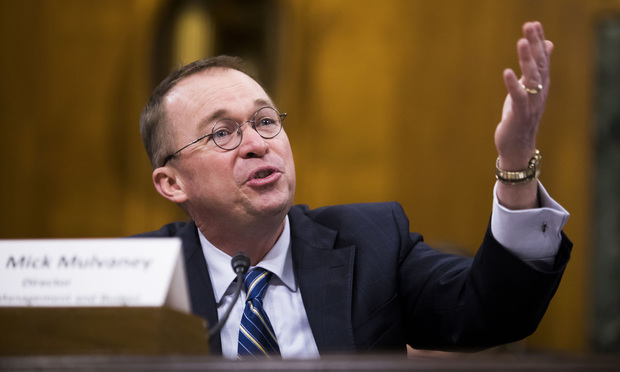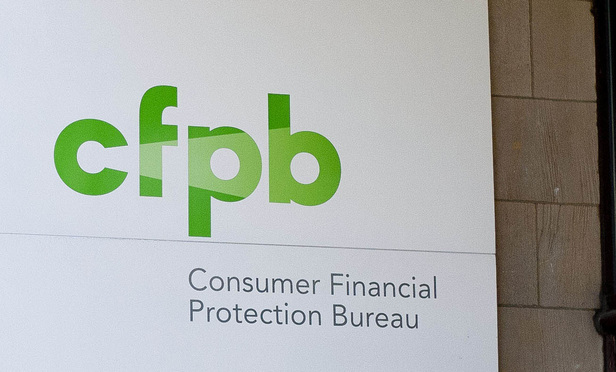Bank Lobbyists Bolster Mick Mulvaney's Rebranding of CFPB
Or is it the BCFP? The agency's Trump-appointed interim director says he's just sticking to the statute.
April 27, 2018 at 02:30 PM
7 minute read
 Mick Mulvaney testifies in February before the Senate Budget Committee about the Trump administration's budget. Credit: Diego M. Radzinschi / NLJ
Mick Mulvaney testifies in February before the Senate Budget Committee about the Trump administration's budget. Credit: Diego M. Radzinschi / NLJ Speaking before a crowd of 1,300 bankers and lending industry officials this week, Mick Mulvaney addressed what he considers an original sin at the Consumer Financial Protection Bureau: calling itself the “CFPB” rather than its statutory name, the Bureau of Consumer Financial Protection.
Mulvaney, the bureau's interim leader, said he was “trying to get in the habit of now saying the 'BCFP.'” The shift hasn't been easy.
“It's really, really hard to do that when you've said the CFPB for so long,” Mulvaney told the audience gathered for an American Bankers Association conference in Washington.
Lobbyists for the financial industry, in recent comments to the CFPB, appear to have made a smoother transition.
Several trade groups representing the financial industry referred to the agency as the “Bureau of Consumer Financial Protection.” The comment letters came ahead of the Thursday deadline for feedback about possible retooling of the CFPB's investigative demands.
Some lobbyists said the wording shifts reflect a deliberate effort to appeal to Mulvaney, who has framed his move to rebrand the agency as a statement of fidelity to the statute. In the past, Mulvaney has criticized the bureau for going beyond the mandates laid out in the Dodd-Frank Act.
A bureau spokesman said in a statement: “This nomenclature furthers the acting director's stated goal of hewing closely to the statute, which states that “[t]here is established in the Federal Reserve System, an independent bureau to be known as the 'Bureau of Consumer Financial Protection.'”
Meeting Mulvaney's message, or nodding to it.
The National Creditors Bar Association said in a letter submitted Thursday that it appreciated “this opportunity to submit the following comments in response to the Bureau of Consumer Financial Protection's (“BCFP” or “Bureau”) request for information regarding civil investigation demands and associated processes.” In a comment letter two years earlier, the group referred to the agency as the “CFPB” or “bureau.”
Other groups embraced the name “Bureau of Consumer Financial Protection,” but not the “BCFP” acronym Mulvaney wants everyone to start using.
ACA International, an industry group for credit and collection professionals, initially referred to the CFPB as the “Bureau of Consumer Financial Protection,” before referring to the agency as the “bureau” throughout its eight-page comment letter. In December, the group called the agency the “Consumer Financial Protection Bureau” in a letter concerning a proposed survey about debt collection disclosures.
The Mortgage Bankers Association in its letter, also dated Thursday, thanked the “Bureau of Consumer Financial Protection.” Still, the group would use the acronym “CFPB” throughout the public comment. The association had referred to the CFPB, on first reference, as the “Consumer Financial Protection Bureau” in comment letters last year—including one submitted just days before the resignation of former CFPB Director Richard Cordray.
The American Bankers Association used both “Bureau of Consumer Financial Protection” and “Consumer Financial Protection Bureau” in its letters to the CFPB under Cordray's tenure.
In July, the group referred to the agency as the “Bureau of Consumer Financial Protection.” Four months later, in a letter about mortgage lending rules, the bankers association referred to the agency as the “Consumer Financial Protection Bureau.” The bankers association in recent correspondence—for instance, April, February and January—has consistently called the agency the “Bureau of Consumer Financial Protection.”
In a joint letter Thursday, the Financial Services Roundtable and Consumer Bankers Association referred to the agency as the “Bureau of Consumer Financial Protection.” The Consumer Bankers Association referred to the bureau as the “BCFP” in a press release about the letter Friday. Last June, the two groups submitted a joint letter that called it the “Consumer Financial Protection Bureau.”
There are earlier examples of the Consumer Bankers Association addressing the agency as the “Bureau of Consumer Financial Protection,” including a comment the group submitted with the American Bankers Association in December 2016.
On Friday, Ballard Spahr partner Richard Andreano Jr., who heads the firm's mortgage banking group, noted in a blog post that the agency—he used the acronym “CFPB”—”is now referring to itself as the 'Bureau of Consumer Financial Protection.'”
Mulvaney: “I don't know why we call it the CFPB.”
Mulvaney's rebrand of the CFPB has taken on perhaps outsize significance as consumer groups have questioned whether the change is meant to diminish the agency's public profile and emphasize its place in the government bureaucracy rather than as a protector of consumers.
In March, the bureau unveiled a new seal featuring an eagle encircled with the words “Bureau of Consumer Financial Protection.” When it announced a $1 billion settlement with Wells Fargo & Co. over auto lending and mortgage abuses earlier this month, the CFPB featured that seal instead of its customary green logo spelling out “CFPB” in lower-case letters. The news release identified the agency as “the Bureau of Consumer Financial Protection.”
But the bureau has not stopped there. The Associated Press reported this month that the CFPB has asked the news organization to change its entry in the AP Stylebook—a reference used widely within the media industry—to refer to the agency as the “Bureau of Consumer Financial Protection.”
“We are in the process of updating our own materials to reflect our legal name and would appreciate your (Stylebook) being similarly updated,” a CFPB spokesman, David Mayorga, said in the request.
 Consumer Financial Protection Bureau building in Washington, D.C. June 4, 2013. Photo by Diego M. Radzinschi/ALM
Consumer Financial Protection Bureau building in Washington, D.C. June 4, 2013. Photo by Diego M. Radzinschi/ALM Mulvaney told a congressional panel earlier this month: “I don't know why we call it the CFPB, but that is not the name of the organization.”
At least for now, consumer advocacy groups are not going along with Mulvaney's preferred name for the bureau.
This week, as he put the final touches on a comment letter for a coalition of consumer groups, University of Utah law professor Chris Peterson stopped to consider whether he should edit the draft to refer to the agency as the “Bureau of Consumer Financial Protection.”
It was a brief pause.
“I think until there's something a little more official to hang our hats on, so long as the bureau continues to refer to itself as the 'CFPB' in places other than hotel ballrooms with bank lobbyists, the [Consumer Federation of America] is going to continue to call the agency what the agency calls itself,” said Peterson, a former CFPB attorney who, in addition to teaching classes at University of Utah's S.J. Quinney College of Law, serves as the federation's director of consumer financial services.
Indeed, the agency officials' email addresses still include “@cfpb.gov,” and the website—consumerfinance.gov—prominently still identifies the agency as “CFPB” and “Consumer Financial Protection Bureau.”
Mulvaney's push to rebrand the CFPB, Peterson said, is “symptomatic of the more important, systemic changes that have been happening inside the agency and is also an overt effect to erode the ability of the public to identify what the agency is.”
“So I think it's a meaningful issue,” he added. “It's an important issue. Is it as big a deal as some of the other things? I don't think so. But I think it's important.”
This content has been archived. It is available through our partners, LexisNexis® and Bloomberg Law.
To view this content, please continue to their sites.
Not a Lexis Subscriber?
Subscribe Now
Not a Bloomberg Law Subscriber?
Subscribe Now
NOT FOR REPRINT
© 2025 ALM Global, LLC, All Rights Reserved. Request academic re-use from www.copyright.com. All other uses, submit a request to [email protected]. For more information visit Asset & Logo Licensing.
You Might Like
View All
FTC Sues PepsiCo for Alleged Price Break to Big-Box Retailer, Incurs Holyoak's Wrath
5 minute read
Supreme Court Will Hear Religious Parents' Bid to Opt Out of LGBTQ-Themed School Books

Wells Fargo and Bank of America Agree to Pay Combined $60 Million to Settle SEC Probe
Trending Stories
- 1Reviewing Judge Merchan's Unconditional Discharge
- 2With New Civil Jury Selection Rule, Litigants Should Carefully Weigh Waiver Risks
- 3Young Lawyers Become Old(er) Lawyers
- 4Caught In the In Between: A Legal Roadmap for the Sandwich Generation
- 5Top 10 Developments, Lessons, and Reminders of 2024
Who Got The Work
J. Brugh Lower of Gibbons has entered an appearance for industrial equipment supplier Devco Corporation in a pending trademark infringement lawsuit. The suit, accusing the defendant of selling knock-off Graco products, was filed Dec. 18 in New Jersey District Court by Rivkin Radler on behalf of Graco Inc. and Graco Minnesota. The case, assigned to U.S. District Judge Zahid N. Quraishi, is 3:24-cv-11294, Graco Inc. et al v. Devco Corporation.
Who Got The Work
Rebecca Maller-Stein and Kent A. Yalowitz of Arnold & Porter Kaye Scholer have entered their appearances for Hanaco Venture Capital and its executives, Lior Prosor and David Frankel, in a pending securities lawsuit. The action, filed on Dec. 24 in New York Southern District Court by Zell, Aron & Co. on behalf of Goldeneye Advisors, accuses the defendants of negligently and fraudulently managing the plaintiff's $1 million investment. The case, assigned to U.S. District Judge Vernon S. Broderick, is 1:24-cv-09918, Goldeneye Advisors, LLC v. Hanaco Venture Capital, Ltd. et al.
Who Got The Work
Attorneys from A&O Shearman has stepped in as defense counsel for Toronto-Dominion Bank and other defendants in a pending securities class action. The suit, filed Dec. 11 in New York Southern District Court by Bleichmar Fonti & Auld, accuses the defendants of concealing the bank's 'pervasive' deficiencies in regards to its compliance with the Bank Secrecy Act and the quality of its anti-money laundering controls. The case, assigned to U.S. District Judge Arun Subramanian, is 1:24-cv-09445, Gonzalez v. The Toronto-Dominion Bank et al.
Who Got The Work
Crown Castle International, a Pennsylvania company providing shared communications infrastructure, has turned to Luke D. Wolf of Gordon Rees Scully Mansukhani to fend off a pending breach-of-contract lawsuit. The court action, filed Nov. 25 in Michigan Eastern District Court by Hooper Hathaway PC on behalf of The Town Residences LLC, accuses Crown Castle of failing to transfer approximately $30,000 in utility payments from T-Mobile in breach of a roof-top lease and assignment agreement. The case, assigned to U.S. District Judge Susan K. Declercq, is 2:24-cv-13131, The Town Residences LLC v. T-Mobile US, Inc. et al.
Who Got The Work
Wilfred P. Coronato and Daniel M. Schwartz of McCarter & English have stepped in as defense counsel to Electrolux Home Products Inc. in a pending product liability lawsuit. The court action, filed Nov. 26 in New York Eastern District Court by Poulos Lopiccolo PC and Nagel Rice LLP on behalf of David Stern, alleges that the defendant's refrigerators’ drawers and shelving repeatedly break and fall apart within months after purchase. The case, assigned to U.S. District Judge Joan M. Azrack, is 2:24-cv-08204, Stern v. Electrolux Home Products, Inc.
Featured Firms
Law Offices of Gary Martin Hays & Associates, P.C.
(470) 294-1674
Law Offices of Mark E. Salomone
(857) 444-6468
Smith & Hassler
(713) 739-1250











